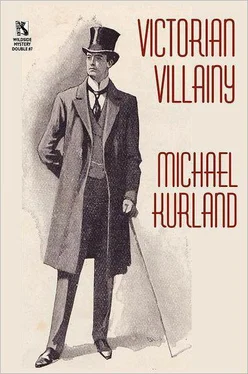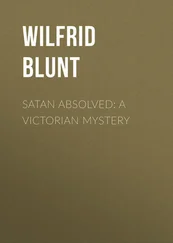Michael Kurland - Victorian Villainy
Здесь есть возможность читать онлайн «Michael Kurland - Victorian Villainy» весь текст электронной книги совершенно бесплатно (целиком полную версию без сокращений). В некоторых случаях можно слушать аудио, скачать через торрент в формате fb2 и присутствует краткое содержание. Жанр: Классический детектив, на английском языке. Описание произведения, (предисловие) а так же отзывы посетителей доступны на портале библиотеки ЛибКат.
- Название:Victorian Villainy
- Автор:
- Жанр:
- Год:неизвестен
- ISBN:нет данных
- Рейтинг книги:5 / 5. Голосов: 1
-
Избранное:Добавить в избранное
- Отзывы:
-
Ваша оценка:
- 100
- 1
- 2
- 3
- 4
- 5
Victorian Villainy: краткое содержание, описание и аннотация
Предлагаем к чтению аннотацию, описание, краткое содержание или предисловие (зависит от того, что написал сам автор книги «Victorian Villainy»). Если вы не нашли необходимую информацию о книге — напишите в комментариях, мы постараемся отыскать её.
Victorian Villainy — читать онлайн бесплатно полную книгу (весь текст) целиком
Ниже представлен текст книги, разбитый по страницам. Система сохранения места последней прочитанной страницы, позволяет с удобством читать онлайн бесплатно книгу «Victorian Villainy», без необходимости каждый раз заново искать на чём Вы остановились. Поставьте закладку, и сможете в любой момент перейти на страницу, на которой закончили чтение.
Интервал:
Закладка:
“Well then,” Holmes said briskly, “we must go up.”
I examined the cliff face behind us. “Possible,” I concluded. “Difficult, but possible.”
“But first we must scuff up the ground by the cliff edge in a convincing manner,” said Holmes.
“Let us run through the third and fourth Baritsu katas,” I suggested. I took off my inverness and put it and my owl-headed walking stick and hat on a nearby outcropping and assumed the first, or “waiting crab” Baritsu defensive position.
Holmes responded by taking off his hat and coat. “We must be careful not to kill each other by accident,” he said. “I should hate to kill you by accident.”
“And I, you,” I assured him.
We ran through the martial exercises for about a quarter-hour, getting ourselves and the ground quite scuffed up in the process. “Enough!” Holmes said finally.
“I agree,” I said. “One last touch.” I took my stick from the rock and gave the handle a quarter turn, releasing the 8-inch blade concealed within. “I hate to do this,” I said, ‘but in the interest of verisimilitude…”
Holmes eyes me warily while I rolled up my right sleeve and carefully stabbed my arm with the sharp point of the blade. I smeared the last few inches of the blade liberally with my own blood, and then threw the weapon aside as though it had been lost in combat. The shaft of the stick I left by the rock. “For queen and country,” I said, wrapping my handkerchief around the cut and rolling down my sleeve.
“Left handed, are you?” Holmes asked. “I should have guessed.”
We retrieved the rest of our clothing and began climbing the almost-sheer face of the cliff above us. It was slow, tedious work, made more dangerous by the fact that it was already late afternoon, and the long shadows cast across the chasm made it difficult to see clearly.
After about twenty minutes, Holmes who, despite a constant stream of muttered complaints, had been clambering up the cliff side with great energy, and was about two body lengths above me, cried out, “Aha! Here is a shelf big enough to hold us! Perhaps we should rest here.”
I scrambled up beside him, and the two of us lay on the moss-covered rock shelf with just our heads showing over the edge as we peered down into the gathering dusk below. We were, I estimate, some two hundred feet above the ledge we had left.
I’m not sure how long we lay there, as it was too dark to read the face of my pocket watch and we dare not strike a light. But after some time we could make out somebody coming onto the ledge we had recently deserted. He was carrying a small lantern, in the light of which he proceeded to make a minute study of the earth, the surrounding rocks, and the cliff face both above and below the ledge, although he didn’t cast the beam high enough to see us where we were peering down at him. After a minute he found the cigarette box that Holmes had left for Watson, and he carefully opened it, read the note inside, then closed it again and replaced it on the rock. Another minute’s searching brought him to the bloodied blade, which he peered at closely, tested with his finger, and then secured under his coat. Then he slowly went back the way he had come, closely examining the footprints on the path as he went.
About ten minutes later we heard voices below, and four men approached the cliff edge: two Swiss men from the inn in their green lederhosen, carrying large bright lanterns; Dr. Watson, and the man who had recently left. “No,” the man was saying as they came into view, “I saw no one on the trail. I do not know what happened to your friend.”
Watson wandered about the cliff, looking here and there without really knowing what he was looking at, or for. “Holmes!” he cried. “My God, Holmes, where are you?”
Holmes stirred next to me and seemed about to say something, but he refrained.
One of the Swiss men spotted the silver cigarette box. “Is that a belonging of your friend?” he asked, pointing to it.
Watson rushed over to it. “Yes!” he said. “That is Holmes’s.” He turned it over in his hand. But why-” Opening the box, he pulled out the letter, tearing it halfway down the middle in the process. “Moriarty!” he said, reading the letter by the light of one of the lanterns. “Then it has happened. It is as I feared.” He folded the letter and put it in his pocket, and went over to the edge of the cliff to peer down into the inky blackness below. “Goodby, my friend,” he said, his voice choked with emotion. “The best and finest man I have ever known.” Then he turned to the others. “Come,” he said, “we can do no good here.”
As we were unable to safely climb down in the dark, Holmes and I spent the night on that rock shelf, our greatcoats offering what protection they could from the chill wind. Shortly before dawn a cold rain fell, and we were drenched and chilled before first light, when we were finally able to make our way back down to the ledge below. We traveled overland on foot, with an occasional ride on the ox cart of a friendly farmer, for the next two days until we reached Wurstheim, where we settled into the Wurstheimer Hof, bathed, slept for twelve hours, bought suitable clothing, and altered our appearance. The next morning I went down to a stationer’s and procured some drafting supplies, and then spent a few hours in my room creating a few useful documents. Leaving Wurstheim late that afternoon were a French officer of Artillery in mufti-Holmes speaks fluent French, having spent several years in Montpellier during his youth, and makes quite a dashing officer of Artillery-and a German Senior Inspector of Canals and Waterworks. I have no idea whether there actually is such a position, but the papers I drew up looked quite authentic. I also crafted one more document that I thought might be useful.
“The world lost a master forger when you decided to become a, ah, professor of mathematics, Moriarty,” Holmes told me, looking over the papers I had produced with a critical eye. “The watermarks would give the game away, if anyone is astute enough to examine them, but you’ve done a very creditable job.”
“Praise from the master is praise indeed,” I told him.
He looked at me suspiciously, but then folded up the laisser-passer I had created for him and thrust it into an inner pocket.
In the early afternoon of the 14 ^ th of May we arrived in Kreuzingen, a small town on the east shore of Lake Constance, or as the Germans call it, Bodensee-a great swelling in the river Rhine some forty miles long and, in places, ten miles wide. It is where Switzerland, Germany, and Austria meet, or would meet if there weren’t a lake in the way. We boarded the paddle steamer Konig Friedrich for the four-hour trip across to Lindau, a quiet resort town on the German side of the lake. Holmes, as Le Commandant Martin Vernet of the Corps d’Artillerie, had his hair parted in the middle and severely brushed down on both sides and sported a quite creditable brush mustache. He wore a severely-tailored grey suit with the miniature ribbon of a Chevalier of the Legion d’Honneur in his button-hole, and cultivated a slight limp. He would effect a complete lack of knowledge of either German or English, and thus stood a good chance of overhearing things he was not meant to overhear.
I became Herr Inspektor Otto Stuhl of the Buro des Direktors der Kanale und des Wasserversorgung, and thus could be expected to take an interest in water and all things wet, which gave me a plausible reason to poke around in places where I had no business poking around.
We amused ourselves on the trip across by discerning the professions of our fellow passengers. The Swiss, like the Germans, make the task simpler by dressing strictly according to their class, status and occupation. We disagreed over a pair of gentlemen with ruffled shirts and double rows of brass buttons going down their overly-decorated lederhosen. I guessed them to be buskers of some sort, while Holmes thought them hotel tour guides. On overhearing their conversation, we determined them to be journeymen plumbers. Holmes glared at me as though it were somehow my fault.
Читать дальшеИнтервал:
Закладка:
Похожие книги на «Victorian Villainy»
Представляем Вашему вниманию похожие книги на «Victorian Villainy» списком для выбора. Мы отобрали схожую по названию и смыслу литературу в надежде предоставить читателям больше вариантов отыскать новые, интересные, ещё непрочитанные произведения.
Обсуждение, отзывы о книге «Victorian Villainy» и просто собственные мнения читателей. Оставьте ваши комментарии, напишите, что Вы думаете о произведении, его смысле или главных героях. Укажите что конкретно понравилось, а что нет, и почему Вы так считаете.










![Brian Thompson - A Monkey Among Crocodiles - The Life, Loves and Lawsuits of Mrs Georgina Weldon – a disastrous Victorian [Text only]](/books/704922/brian-thompson-a-monkey-among-crocodiles-the-life-thumb.webp)

